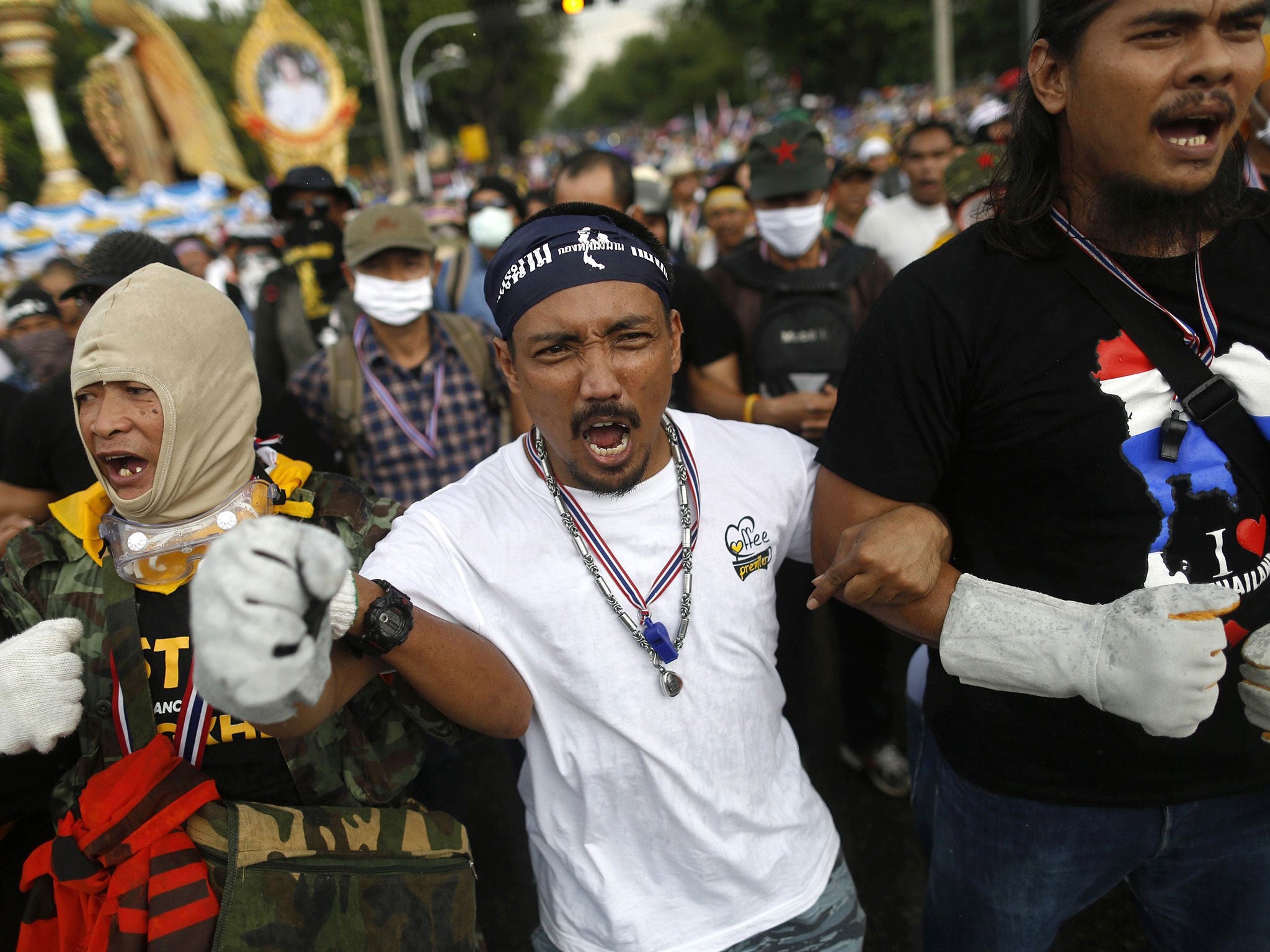Thailand protests: Long shadow of the 'Thaksin regime' prompts new crackdowns in Bangkok
Protesters overrun government ministries in an attempt to topple Yingluck Shinawatra, prompting the Prime Minister to declare a new emergency security law

Your support helps us to tell the story
From reproductive rights to climate change to Big Tech, The Independent is on the ground when the story is developing. Whether it's investigating the financials of Elon Musk's pro-Trump PAC or producing our latest documentary, 'The A Word', which shines a light on the American women fighting for reproductive rights, we know how important it is to parse out the facts from the messaging.
At such a critical moment in US history, we need reporters on the ground. Your donation allows us to keep sending journalists to speak to both sides of the story.
The Independent is trusted by Americans across the entire political spectrum. And unlike many other quality news outlets, we choose not to lock Americans out of our reporting and analysis with paywalls. We believe quality journalism should be available to everyone, paid for by those who can afford it.
Your support makes all the difference.Thailand’s Prime Minister invoked an emergency law on Monday after demonstrators seeking to remove her from office occupied parts of the Finance and Foreign Ministries.
Prime Minister Yingluck Shinawatra announced that the Internal Security Act would cover all of Bangkok and large parts of surrounding areas. Three especially sensitive districts of the capital have been under the law since August, when there were early signs of political unrest.
The law authorises officials to seal off roads, take action against security threats, impose curfews and ban the use of electronic devices in designated areas. Peaceful rallies are allowed under the law.
Protesters swarmed into the two ministries earlier in the day, overrunning several buildings and cutting electricity in an escalating campaign to topple Ms Shinawatra .
Protesters say they want her to step down amid claims that her government is controlled by her brother, former Prime Minister Thaksin Shinawatra, who was ousted in a military coup in 2006 for alleged corruption. On Sunday, more than 150,000 demonstrators took to Bangkok’s streets in the largest rally Thailand has seen in years, uniting against what they call the “Thaksin regime”.
The incursions into the Finance and Foreign Ministries were the boldest acts yet in opposition-led protests that started last month. They highlighted the movement’s new strategy of paralysing the government by forcing civil servants to stop working.
The opposition Democrat Party, which is spearheading the protests and has lost to Thaksin-backed parties in every election since 2001, also plans to challenge the government tomorrow with a parliamentary no-confidence debate.
“The protesters have escalated their rally, which previously was a peaceful one,” Ms Shinawatra said in a televised address. She said the government respected the people’s right to freely express opinions, but also had the responsibility to safeguard the country’s peace and stability and assets, along with the safety of citizens and their right to access government offices.
The law will cover the city’s international airports. In 2008, anti-Thaksin demonstrators occupied Bangkok’s two airports for a week after taking over the Prime Minister’s office for three months.
Protest leader Suthep Thaugsuban led the crowd at the Finance ministry on a day when protesters fanned out to 13 locations across Bangkok, snarling traffic and raising concerns of violence in the country’s ongoing political crisis, which has revolved around Thaksin for years.
“Go up to every floor, go into every room, but do not destroy anything,” Mr Thaugsuban told the crowd before he entered the ministry and held a meeting in its conference room. “Make them see this is people’s power!” saidMr Thaugsuban, a former deputy prime minister and opposition lawmaker.
Protesters sang, danced and blew noisy whistles in the hallways as part of their “whistle-blowing” campaign against the government. One group cut power at the Budget Bureau to pressure it to stop funding government projects. Police made no immediate move to oust them.
The protesters later burst onto the Foreign Ministry grounds, which was not on their original list of targets.
“The protesters are on the Ministry’s compound but they promised they will not enter the buildings,” Foreign Ministry spokesman Sek Wannamethee said by phone.
“We are now asking them to provide ways for the officials who were still working to leave the offices and they will likely have to work from home tomorrow.” He did not know how many protesters there were, though Thai media said there were several hundred.
In a late-night announcement, police spokesman Piya Uthayo said authorities will seek to negotiate with the protesters to take back the government offices they are occupying, and would try their best to avoid the use of force.
The latest protests have ended two years of relative calm under Ms Shinawatra’s government.
Yingluck’s administration has struggled to contain the demonstrations, which started over opposition to a government-backed political amnesty bill that critics said was designed to bring Thaksin Shinawatra home from exile.
The Senate rejected the bill earlier this month in a bid to end the protests. But the rallies have gained momentum since and its leaders have now shifted their target to toppling the so-called “Thaksin regime”.
AP
Join our commenting forum
Join thought-provoking conversations, follow other Independent readers and see their replies
0Comments